Tipping the Balance Towards Openness: Reflections and Suggestions After 10 Years at OGP
Inclinando la balanza hacia la apertura: Reflexiones y recomendaciones después de 10 años en OGP
When I started at OGP 10 years ago, I could not have imagined where OGP, the community, and the world would be now. Back in 2012, I was excited by the simplicity and energyEnsuring universal access to sustainable, dependable, and affordable energy is critical to every aspect of prosperity. Increasing public oversight and transparency in the energy sector can help to ens... More of the original idea of OGP: Creating space for civil society leaders to work on an equal footing with reformers inside government, to jointly push for domestically relevant reforms that would make government work better for and with the people.
By 2017, I was excited to see the OGP approach starting to work. Plans got better, the community grew, OGP mechanisms were refined, and reforms were delivered. In our strategic refresh, we made some bold, exciting choices, like investing in public service deliveryTo ensure that citizens of all groups are better supported by the government, OGP participating governments are working to improve the quality of and access to public services. Commitments in this are... More, prioritizing citizen engagement, and exploring what open government could look like at the local level and in parliament and in the justiceTo address barriers that prevent citizens from having their justice needs met, OGP participating governments are working to expand transparency, accountability, and inclusion into all systems of justi... sector.
Now, in 2022, we have proof of concept. We have shown that changing the culture of government is possible and valuable. We have thousands of inspiring examples. Collectively, we have built the mind and the muscle to scale and tackle the big challenges ahead of us. Ten years into my time with OGP, I want to share with you my perspectives on what worked, what hasn’t, and what is next through the lens of OGP’s big promises and pitches.
Tipping the balance in favor of openness
In my time at OGP, I’ve seen our community grow, deliver thousands of reforms, and convince countless political leaders to support the open gov agenda. We’ve advanced old and new topics and norms and standards, captured and shared inspiration, engaged local governments, and built thematic coalitions. At the same time, the forces opposing openness and inclusionOGP participating governments are working to create governments that truly serve all people. Commitments in this area may address persons with disabilities, women and girls, lesbian, gay, bisexual, tr... More have also advanced strongly. The balance hasn’t been tipped in favor of openness yet, even though ‘Team Open’ has made enormous progress and is showing pockets of success.
In our first decade, among our national members, six have expanded, seven maintained, and the rest diminished civil liberties. Governments are closing a bit faster than they are opening up. Still, I am inspired daily by how smart reformers keep finding new angles to use the space OGP creates to push back and keep moving forward.
The open dataBy opening up data and making it sharable and reusable, governments can enable informed debate, better decision making, and the development of innovative new services. Technical specifications: Polici... and access to information space is particularly impressive. TransparencyAccording to OGP’s Articles of Governance, transparency occurs when “government-held information (including on activities and decisions) is open, comprehensive, timely, freely available to the pub... More has always been the most popular of the OGP values seen in commitments. In the early days, opening up government-held information ran under the motto ‘more is better’, especially when it came to open data. Uptake and usability were of lesser concern. Now we see a strong push for proactive disclosure, online and free of charge, regularly updated, openly licensed, and in a machine readable format. The community is creating a patchwork of policies, approaches, and reforms that collectively lifts access to information to the next level. In ten years, the community has grown stronger and more specific.
The number of commitments dealing with participation, OGP’s second core value, has steadily grown, making participatory and deliberative elements of democracy a more frequent part of government decision making processes.
Unfortunately, the third OGP value, accountability, is declining in emphasis, threatening the sustainability of reforms. Going forward, we need to keep advancing all three, raising the bar, and giving an extra push on accountability reforms.
Governments are much more likely to be effective and credible if they open their doors to public input and oversight.
Opening up government-held information is a key element in allowing public input and oversight, which brings me to one of OGP’s early tenets: Governments are much more likely to be effective and credible if they open their doors to public input and oversight (Four-Year Strategy 2015-2018). This insight is backed up by convincing evidence: Social audits are linked to more effective service provision and higher citizen trust, participatory budgeting is linked to more effective tax collection and tax morale, and CSO monitoring of contracts is linked to more cost-effective public works and services. We also know that when citizens are involved in shaping regulations, regulations are viewed as more legitimate and see higher compliance. In places like Armenia and the Republic of Korea, we’ve seen how politicians coming in on a wave of discontent can gain citizen trust and advance their reform agendas through OGP. However, despite the evidence of these specific interventions showing significant results, the rewards for investing in citizen-centered government and good reforms take time, so the fast food appeal of populistic promises can be more enticing to citizens.
Good ideas come from everywhere
One of the leading principles of OGP is that good ideas can come from everywhere. So Mexico can learn from Malawi and Norway can learn from Nigeria. Ideas from everywhere need to be followed by relevant actions on the ground, and OGP brings that unique value through domestic action plans. After ten years, we know it works and resonates. We definitely should innovate around what action looks like – like we did with OGP Local – but always keep it at our core. The last thing the world needs is another talk shop.
That original design principle of cross-fertilization of ideas across the globe is one of our strongest successes. OGP responds to global trends, including the development of new thinking. No country or region has a monopoly on best practices in open government, we all have something to share and learn. That’s why OGP emphasizes and facilitates peer support and inspiration. Seeing eyes light up when reformers realize someone on the other side of the world holds a piece to their puzzle is one of the most rewarding parts of our work. We’ve seen this in peer exchanges between Italy and South Africa on opening up government spending and citizen monitoring, Senegal and Canada on justice reforms, and Georgia and Mexico on freedom of information. The strongest examples go global and move beyond the G7/global north bias, such as the success stories of ProZorro/DoZorro (Ukraine) or of the Decide Madrid participation platform, which has been replicated across many of our members. I will never forget how the community – from Georgia to North Macedonia to Canada – worked tirelessly and jointly to get some of their Afghan peers and their families to safety and on to a new life.
Creating space for reformersand giving civil society a seat at the table
One of our strongest achievements is creating space and recognition for the reformers at the heart of our community. On the government side, the requirements and expectations that come with OGP help enforce delivery, create opportunities for political access, and give leverage to bring in other parts of government. Over time, we have seen less turn-over in the lead OGP office, an aspect of institutionalization that is associated with stronger early resultsEarly results refer to concrete changes in government practice related to transparency, citizen participation, and/or public accountability as a result of a commitment’s implementation. OGP’s Inde... More.
On the civil society side, the dialogue and co-creation requirements have led to more inclusive processes and a steady improvement in the existence and quality of the permanent dialogue platforms (MSFs). Survey results over the years show that roughly two thirds of civil society respondents believe the action planAction plans are at the core of a government’s participation in OGP. They are the product of a co-creation process in which government and civil society jointly develop commitments to open governmen... matches a majority or all of civil society’s priorities.
We asked civil society last year what value proposition resonates most when they speak to others about open government. Their number one answer was that OGP gives them a seat at the table for their advocacy priorities. In my ten years, I have seen this seat become more influential and more permanent. OGP has also managed to showcase what government and civil society working together looks like. Not just around co-creation but also implementation. The latest findings from our Vital Signs report prove that if government and civil society work together, you get more ambitious commitments that show better early results.
Summits, peer exchanges, awards give visibility to specific reform agendas and they create political backing, and a space for the reformers themselves. Connecting reformers in government to their peers in other countries is an important element. Civil society is often well connected, but it is more rare for bureaucrats. OGP helps grow coalitions on topics like beneficial ownershipDisclosing beneficial owners — those who ultimately control or profit from a business — is essential for combating corruption, stemming illicit financial flows, and fighting tax evasion. Technical... More and democratic freedoms and connects communities nationally and thematically that often were siloed before.
Putting citizens back at the heart of government
I have always felt that the OGP process itself is not the right place to directly engage citizens and there are few instances where they have been directly involved in OGP co-creation. The policies and reforms that flow from OGP on the other hand often create broader opportunities for citizens shaping and overseeing policies, working with governments, and engaging meaningfully. We see this in this recent story from Ukraine, in the well-known Kaduna “Eyes and Ears” example, and in Ireland when a citizens’ assembly helped to break years of political deadlock around abortion.
The antidote to populistic promises is directly improving citizens’ lives. Citizens meet governments much more directly and concretely at the local level. And the appetite is there, with our local program scaling from 20 to 106 members in only two years. Whatever the OGP’s future looks like, open local government will have to be a core path to bigger impact. That’s where OGP can best create convincing spaces for citizens to be involved in decision making.
Democracy beyond the ballot box
“Democracy beyond the ballot box” is one of my personal favorite ways of describing OGP. It summarizes both the challenges and the opportunities and what open government is all about. Democracy is more than policies, institutions, and election cycles. It is about active citizenship, honest dialogue, and two-way trust between governments and people. A system in which citizens have a real say in how their society is run and what choices are made, not once every four to five years, but daily. Again I see progress, even against a backdrop of continuous democratic decline and decreasing levels of trust.
Much of the energy and momentum of the early days came from a positive can-do excitement around open government. I believe we have to move away from process compliance and punitive structures towards that energy and optimism. A focus on inspiration and innovation and on building an infrastructure and community of connections and energy can clear a path to a more sustainable and positive future amidst a tide of bleak news.
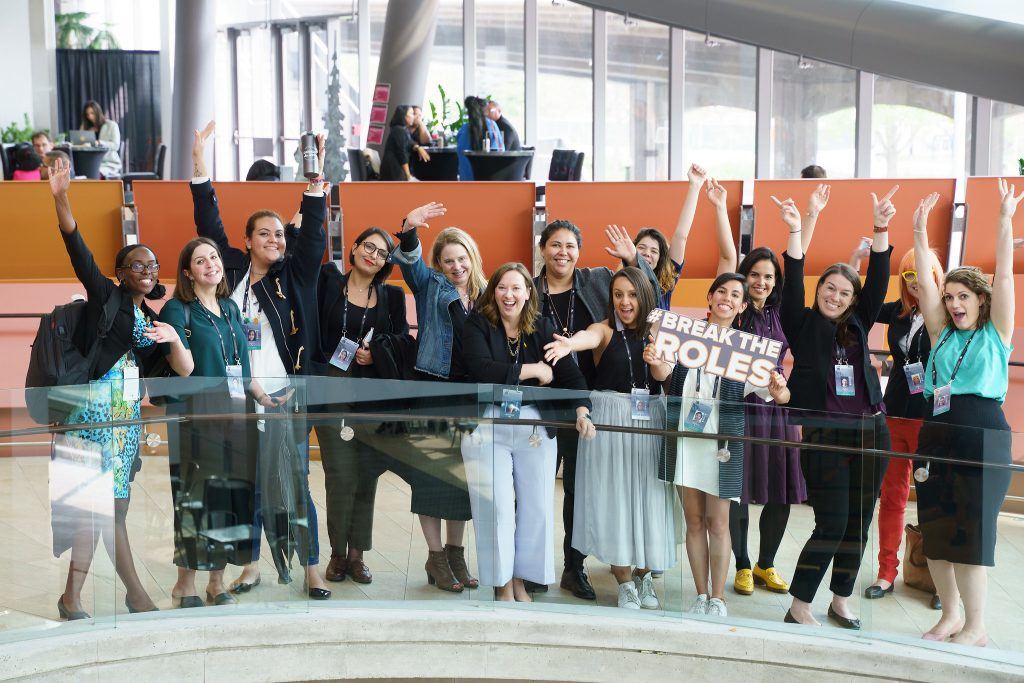
The Break the Roles campaign pushed OGP members to take meaningful action on genderOGP participating governments are bringing gender perspectives to popular policy areas, ensuring diversity in participatory processes, and specifically targeting gender gaps in policies to address gov... More inclusion.
Changing the culture of government
Collectively, we can’t claim to have changed the culture of government, certainly not at scale and not across all our members. Giving civil society – let alone citizens – an equal seat at the table is still not common practice. Yet we have powerfully demonstrated that it is possible and effective.
One clear area of success and scale can be found in our campaigns. At the global level, they inspire and set the tone for action. At the national level, impact comes with a delay, but it comes. We saw Break the Roles bring new actors to the table and increase gender and inclusion commitments. Open Response + Open Recovery gave us hope and ways to address the challenges posed by the pandemic through open government.
Conclusion
In 2011, OGP was the right idea at the right moment. It created energy, connected people, and innovated domestic and international collaboration After years of hard work, the beginning of change is there. We have proof of concept, not of scale.
In my view, our ambition should continue to be making societies, democracies stronger, making them deliver better for and with citizens through open government. Open government as a concept, as an approach is as relevant as when I joined ten years ago. Open government to fight corruption; Open government to strengthen public services; Open government to address inclusion and inequality; Open government to address climate change; Open government to reimagine democracy. During the pandemic, we figured out how open government approaches could help curb the pandemic and approach the recovery. In Ukraine, open government thinking is brought into early planning for the rebuilding of the country.
Creating a noticeable difference at scale is our number one challenge for the future. As we develop a new strategy for the five years ahead, I see four promising paths to impact.
- Grow, connect and recognize reformers by investing in their skills and capacity and providing support and inspiration.
- Continue to bring in new branches, offices and levels of government and especially growing open government at the local level, where citizens are closest to government and where trust and lived realities can more easily be improved;
- Keep a broad thematic agenda, acknowledging different contexts and needs. At the same time, become more explicit about expected ambitionAccording to OGP’s Articles of Governance, OGP commitments should “stretch government practice beyond its current baseline with respect to key areas of open government.” Ambition captures the po... and progress on select core open government topics.
- Shape and share value propositions and examples that are so powerful that open government becomes unavoidable for politicians.
If in ten years from now we want to have decisively tipped the balance in favor of openness, inclusion, participation – in favor of open government – we will need to grow our community, appeal and impact. Our starting point for that is incredibly strong. The last decade we have created an impressive collection of strengths, tactics, innovations, connections and experiences to convince skeptics and tackle challenges.
Hace 10 años, cuando empecé a trabajar en OGP, nunca hubiera imaginado a dónde llegaría OGP, la comunidad y el mundo. En 2012, me emocionaba la simplicidad y fuerza de la idea original de OGP: Crear un espacio en el que las y los líderes de la sociedad civil podían trabajar con reformadores de gobierno en una posición de igualdad para, de forma conjunta, impulsar reformas que harían que los gobiernos trabajaran en favor de la ciudadanía y en colaboración con ella.
En el 2017, me emocionaba que el modelo de OGP estaba empezando a funcionar. Los planes eran de mejor calidad, la comunidad estaba creciendo, se perfeccionaron los mecanismos de OGP y se materializaban las reformas. En nuestra actualización estratégica, tomamos algunas decisiones audaces, por ejemplo invertir en la provisión de servicios públicos, priorizar la participación ciudadana y explorar un modelo de gobierno abierto a nivel local, en los parlamentos y en el sector judicial.
Hoy, en 2022, ya tenemos una prueba de concepto. Hemos demostrado que sí es posible e importante cambiar la cultura del gobierno. Contamos con miles de ejemplos inspiradores. Juntas y juntos, hemos construido la fuerza para escalar y para atender los grandes retos que estamos enfrentando. A diez años de mi trabajo con OGP, quiero compartir mi perspectiva sobre lo que ha funcionado, lo que no y algunos siguientes pasos a través de la perspectiva de las promesas de OGP.
Inclinando la balanza en favor de la apertura
Durante mi tiempo en OGP, he visto a la comunidad crecer, desarrollar miles de reformas y convencer a un sinfín de líderes políticos en favor de la agenda de gobierno abierto. Hemos impulsado temas, normas y estándares, encontrado y compartido historias inspiradoras, trabajado con gobiernos locales y creado coaliciones temáticas. Al mismo tiempo, las fuerzas que se oponen a la apertura y la inclusión también han avanzado fuertemente. Aunque hemos logrado enormes avances y demostrado casos de éxito, la balanza todavía no se inclina a favor de la apertura.
Durante nuestros primeros diez años, seis miembros nacionales mejoraron sus libertades cívicas, siete las mantuvieron y el resto las redujo. Los gobiernos se están cerrando más rápido de lo que se están abriendo. De cualquier manera, yo sigo encontrando inspiración en ver que un grupo de reformadores ha seguido encontrando ángulos para utilizar el espacio de OGP para luchar contra esta tendencia y seguir avanzando.
El espacio de datos abiertos y acceso a la información es especialmente impresionante. La transparencia siempre ha sido el valor más popular en OGP. En los primeros días, la apertura de la información de gobierno se regía por el lema “más es mejor”, especialmente en el tema de datos abiertos. La adopción y utilidad de los datos tenían menos prioridad. Hoy, estamos viendo un interés por promover la transparencia proactiva y la publicación de datos en línea, sin costo, con actualizaciones constantes, con licencias abiertas y en formatos legibles por máquina. La comunidad está creando una serie de políticas, metodologías y reformas que, de forma colectiva, están llevando el acceso a la información al siguiente nivel. En diez años, la comunidad se ha fortalecido y se ha tornado más específica.
La cantidad de compromisos enfocados en la participación, segundo valor de OGP, ha crecido constantemente, haciendo de los elementos participativos y deliberativos de la democracia componentes más frecuentes del proceso de toma de decisiones de los gobiernos.
Desafortunadamente, el tercer valor de OGP, la rendición de cuentas, es cada vez menos frecuente, amenazando la sustentabilidad de las reformas. En el futuro, deberemos seguir impulsando los tres valores, elevando el estándar de calidad e impulsando con mayor énfasis las reformas sobre rendición de cuentas.
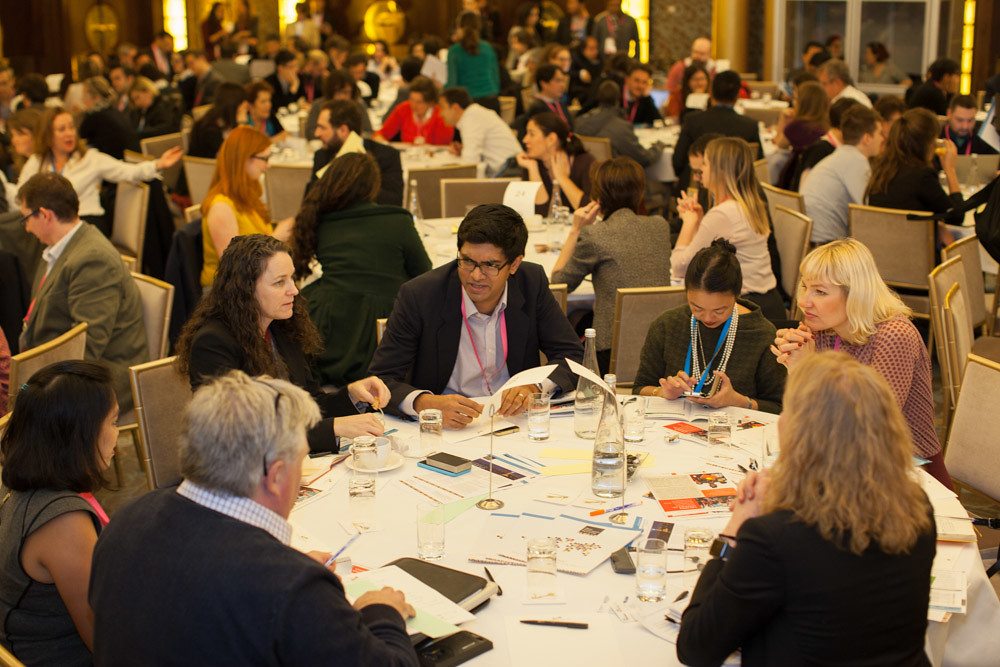
Reformadoras y reformadores de la sociedad civil en un taller durante la cumbre global de OGP de 2016 en París, Francia.
Los gobiernos tienen una probabilidad mucho mayor de ser efectivos y confiables si abren sus puertas a la retroalimentación y supervisión pública.
Abrir la información que el gobierno maneja es un elemento clave que permite la retroalimentación y supervisión del público, lo que me lleva a uno de los primeros preceptos de OGP: Los gobiernos tienen una probabilidad mucho mayor de ser efectivos y confiables si abren sus puertas a la retroalimentación y supervisión del público (estrategia a cuatro años 2015-2018). Esta declaración está respaldada por evidencia: las auditorías sociales están vinculadas a una provisión más efectiva de los servicios públicos y a una mayor confianza ciudadana; los presupuestos participativos están vinculados a una mejor recaudación fiscal y el monitoreo de contratos por parte de la sociedad civil está vinculada a servicios y obras públicas más costo-efectivas. Además, sabemos que, cuando la ciudadanía se involucra en definir el marco regulatorio, las regulaciones se perciben como más legítimas y llevan a una mejor aplicación. En países como Armenia y la República de Corea, hemos visto que las y los políticos han podido mejorar la confianza del público e impulsar sus agendas a través de OGP. Sin embargo, a pesar de la evidencia que existe que estas intervenciones tienen resultados importantes, los beneficios de invertir en gobiernos enfocados en la ciudadanía toman tiempo, por lo que en ocasiones es más atractivo hacer promesas populistas de corto plazo.
Las buenas ideas vienen de cualquier lugar
Uno de los principios más importantes de OGP es que las buenas ideas pueden surgir de cualquier lugar. México puede aprender de Malawi y Noruega puede aprender de Nigeria. Pero las ideas tienen que estar seguidas de acciones en el territorio y OGP representa esa oportunidad gracias a sus planes de acción. Después de diez años, sabemos que este enfoque funciona y resuena. Definitivamente tenemos que encontrar estrategias innovadoras alrededor de la acción, como lo hicimos con OGP Local, pero la acción siempre debe estar en el corazón. Lo último que el mundo necesita es otro lugar solo para discursos. Este principio de diseño de fertilización cruzada de ideas en todo el mundo es uno de nuestros mayores logros. OGP responde a las tendencias globales, incluyendo el desarrollo de nuestras ideas. Ningún país o región tiene el monopolio de las buenas prácticas de gobierno abierto, todas y todos tenemos algo que aprender y algo que compartir. Es por ello que OGP enfatiza y facilita el intercambio de ideas y experiencias. Ver la emoción de una persona cuando se da cuenta que una persona del otro lado del mundo tiene la pieza que le falta a su rompecabezas es una de las partes más gratificantes de nuestro trabajo.
Hemos visto esto en intercambios entre Italia y Sudáfrica sobre la apertura de los gastos de gobierno y el monitoreo ciudadano; entre Senegal y Canadá sobre reformas judiciales y entre Georgia y México sobre libertad de información. Los ejemplos más fuertes son globales y van más allá del G7 y el norte global. Ejemplo de ello son las historias de éxito de ProZorro/DoZorro de Ucrania o la plataforma de participación Decide Madrid, la cual se ha replicado en muchos de nuestros miembros. Nunca olvidaré que la comunidad, desde Georgia hasta Macedonia del Norte hasta Canadá, trabajaron incansable y conjuntamente para llevar a sus colegas de Afganistán y sus familias a un espacio seguro y a una nueva vida.
Un espacio para reformadoras y reformadores y voz a la sociedad civil
Uno de nuestros mayores logros es crear un espacio y reconocimiento a las y los reformadores, que son el corazón de nuestra comunidad. Por parte del gobierno, los requisitos y expectativas que OGP implica ayudan a lograr resultados, crear oportunidades de acceso político y apalancar la incorporación de otras instituciones de gobierno. Con el tiempo, hemos visto menos rotación en la oficina que lidera el proceso de OGP, un elemento de institucionalización que se asocia a mejores resultados tempranos.
Por parte de la sociedad civil, los requisitos de diálogo y cocreación han llevado a procesos más incluyentes y a una mejora constante en la existencia y la calidad de las plataformas permanentes de diálogo (foro). Las encuestas aplicadas a lo largo de los años muestran que cerca de dos terceras partes de los encuestados de la sociedad civil opinan que los planes de acción están alineados a la mayoría o a todas las prioridades de la sociedad civil.
El año pasado, consultamos a la sociedad civil qué oferta de valor resuena más cuando hablan sobre el gobierno abierto. La respuesta más común fue que OGP les da un espacio para expresar sus prioridades de incidencia. En mis diez años, he visto que este papel ha ganado influencia y permanencia. Además, OGP ha logrado mostrar la posibilidad de colaboración entre el gobierno y la sociedad civil, no solo en la cocreación, sino también en la implementación. Los hallazgos más recientes de nuestro informe Signos vitales muestran que, cuando el gobierno y la sociedad civil trabajan juntos, obtienen compromisos más ambiciosos y con resultados tempranos más sólidos.
Las cumbres, intercambios y premios le dan visibilidad a ciertas reformas y agendas, además de respaldo político y un espacio a las y los reformadores. Conectar a reformadores de gobierno con sus colegas de otros países es un elemento importante. La sociedad civil tiende a estar bien conectada, pero en el caso de los burócratas no siempre es así. OGP ha ayudado a crear coaliciones en temas como beneficiarios finales y libertades democráticas y conecta a las comunidades geográficas y temáticas que antes estaban aisladas.
Poniendo a las y los ciudadanos en el centro del gobierno Siempre he pensado que el proceso de OGP en sí mismo no es el espacio para involucrar directamente a la ciudadanía y ha habido pocos casos en donde ésta ha participado directamente en la cocreación del proceso de OGP. Más bien, las políticas y reformas que surgen de OGP tienden a crear oportunidades en las que la ciudadanía puede definir y supervisar políticas, trabajar con gobiernos y participar verdaderamente. Esto ocurrió en un caso reciente de Ucrania, en el ejemplo de Kaduna “ojos y oídos” y en Irlanda, en donde una asamblea ciudadana ayudó a romper con años de un estancamiento político alrededor del aborto.
El antídoto contra las promesas populistas es mejorar la vida de la ciudadanía. Las y los ciudadanos tienen una mayor relación con los gobiernos a nivel local y ya se ha mostrado el interés: nuestro programa local escaló de 20 a 106 miembros en solo dos años. En el futuro de OGP, el gobierno abierto a nivel local será fundamental para un mayor impacto.
Democracia más allá de las urnas electorales
“Democracia más allá de las urnas electorales” es una de las descripciones que más me gusta de OGP, pues resume tanto los retos como las oportunidades que implica el gobierno abierto. La democracia va más allá de las políticas, instituciones y ciclos electorales e implica una ciudadanía activa, un diálogo honesto y confianza mutua entre el gobierno y la gente. Es un sistema en el que la ciudadanía tiene voz sobre cómo se maneja la sociedad y sobre las decisiones tomadas, no solo cada cuatro o cinco años, sino todos los días. He visto avances, incluso en medio de la caída de la democracia y el nivel de confianza en los gobiernos.
Una gran parte de la energía e inercia de los primeros días surgieron de la emoción sobre el potencial del gobierno abierto. Creo que debemos ir más allá de cumplir con el proceso y de las estructuras punitivas y tomar esa energía y optimismo. La inspiración e innovación y el desarrollo de una infraestructura y comunidad de conexiones y energía son un camino hacia un futuro sustentable y positivo, en contra de la marea de malas noticias.

La campaña Romper los roles impulsó a los miembros de OGP a tomar medidas a favor de la inclusión de género
La campaña Romper los roles impulsó a los miembros de OGP a tomar medidas a favor de la inclusión de género
Un cambio en la cultura del gobierno
No podemos afirmar que cambiamos la cultura del gobierno, especialmente a escala y en todos los miembros de OGP. Aún no es una práctica común asegurar una verdadera participación a la sociedad civil, y mucho menos de la ciudadanía. Pero hemos demostrado que este enfoque es posible y efectivo.
Encontramos un área clara de éxito en nuestras campañas. A nivel global, éstas han inspirado y establecido la expectativa alrededor de la acción. A nivel nacional, el impacto se ha retrasado, pero ha ocurrido. Vimos que la campaña Romper los roles incorporó a nuevos actores e incrementó la cantidad de compromisos sobre género e inclusión. Por su parte: Respuesta abierta + Recuperación abierta nos dio esperanza e ideas para atender los retos de la pandemia a través del gobierno abierto.
Conclusión
En 2011, OGP fue la idea adecuada en el momento adecuado. El movimiento generó energía, conectó a personas y promovió innovación a nivel nacional y colaboración a nivel internacional. Tras años de trabajo arduo, el inicio del cambio ya está aquí. Tenemos una prueba de concepto, no de escala.
En mi opinión, nuestra ambición debe ser seguir construyendo sociedades y democracias más sólidas que trabajan por y con la ciudadanía a través del gobierno abierto. El gobierno abierto como concepto sigue siendo tan relevante como cuando me incorporé hace diez años. El gobierno abierto en la lucha contra la corrupción, para fortalecer los servicios públicos, para atender la inclusión y la igualdad, para la lucha contra el cambio climático, para renovar la democracia. Encontramos que el gobierno abierto puede frenar la pandemia. En Ucrania, ya se están incorporando conceptos de gobierno abierto en las primeras fases de planeación hacia la reconstrucción del país.
Crear una diferencia notable a escala es nuestro reto principal para el futuro. En el marco de nuestra nueva estrategia para los próximos cinco años, veo cuatro vías prometedoras hacia el impacto.
- Fortalecer, conectar y reconocer a las y los reformadores, invirtiendo en sus capacidades y dándoles apoyo e inspiración;
- Seguir incorporando a otros poderes, oficinas y niveles de gobierno, especialmente a nivel local, en donde la ciudadanía es más cercana a los gobiernos y en donde la confianza y la realidad pueden mejorar más fácilmente;
- Mantener una agenda temática amplia que reconozca los diferentes contextos y necesidades. Al mismo tiempo, ser más explícitos en el nivel de ambición y avance esperados en temas de gobierno abierto específicos;
- Definir y compartir propuestas de valor y ejemplos que sean tan poderosos que el gobierno abierto sea ineludible para las y los políticos.
Si en diez años queremos haber inclinado definitivamente la balanza en favor de la apertura, la inclusión y la participación, es decir, en favor del gobierno abierto, tendremos que haber crecido nuestra comunidad. Nuestro punto de partida es increíblemente fuerte. En los últimos diez años, creamos una colección impresionante de fortalezas, tácticas, prácticas innovadoras, conexiones y experiencias para convencer a las y los escépticos y atender los grandes retos.
Comments (4)
Halima Ben Umar - WIM Kano, Nigeria Reply
I’m really impressed by the level of progress in OGP not only globally but countries and subnational levels. This was great achievements. I believe we are making headways and this great. I honestly enjoyed the report, as I was reading it, I was visualising every bit of the report. CONGRATULATIONS Paul and your team!
Paul Maassen Reply
Thank you Halima and Sotiraq for your kind words. The progress of OGP really is the progress of the community bringing their energy and dedication at local and national level!
Sotiraq – keen to hear your thoughts on what you would see as promising paths forward that are more revolutionary towards system change. Will reach out for a chat!
Aimal Abdullah Reply
Hello to all;
I read the entire article, actually, it was a great article. as a key reformer of the OGP in Afghanistan I have read the important and effective issues which should have been collected and written before, I wish more success to Mr. Paul Massen and hope to be continued such activities by other OGP heavyweights Colleagues to share their impressions and experiences in written form with other colleagues.
Although the OGP mission in Afghanistan has been suspended due to the arrival of the non-democratic extremism and dictatorship of the Taliban. We hope that democracy and the republic will be established once again, civil society and the people’s government will work together like in the past, and Afghanistan will remain a member of the international community.
best regard
Aimal Abdullah
Civil Society Coordination Center of Afghanistan
Leave a Reply
Related Content

Creating OGP’s Future Together – Strategic Planning 2023-2028
Help co-create OGP's new strategy. This page is your go-to resource for all the materials you need to host and join conversations and share your views on how OGP can…
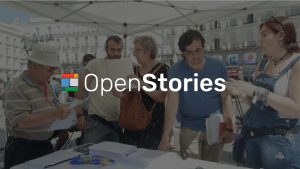
OpenStories
Everyone has a story. Together we have a mission. Explore stories from across the open government community, and submit your own.

OGP Vital Signs – 10 Years of Data in Review
As we reflect on the first 10 years of OGP and plan ahead for the next decade, we look back on data from nearly 200 OGP action plans and assess…

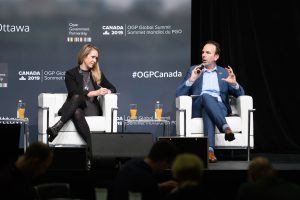
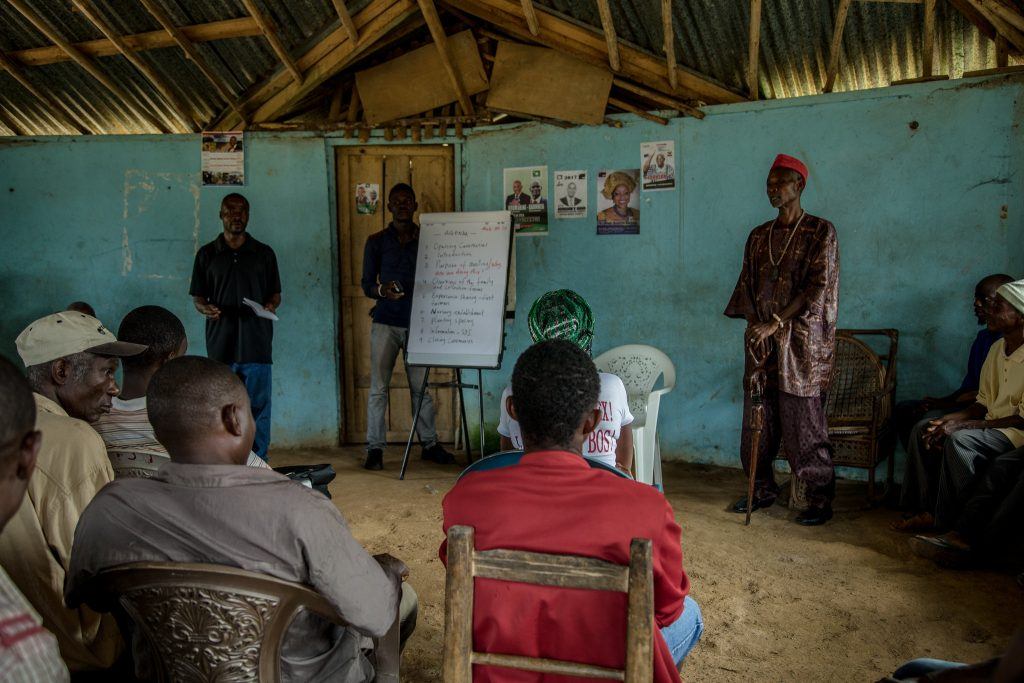
Sotiraq Hroni Reply
I couldn’t agree more with Paul in most of the things he wrote. I would propose that his opinion be discussed in every OGP member country bringing together government and civil society. It may help lead to reset the national OGP precess.
I fully agree also with the concluding statement except for the four promising paths. They seem to me like doing business as usual, and there are very limited instruments that would inspire contributors to reset the system, the thinking, prioritizing what might work. Nobody I think challenges the concept, every body needs proofs of commitment to change and make “democracy work beyond the ballot”. Well this needs time, but we have to use instruments to stop governments playing idle with OGP. It frustrates parties and loose any trust in such processes.